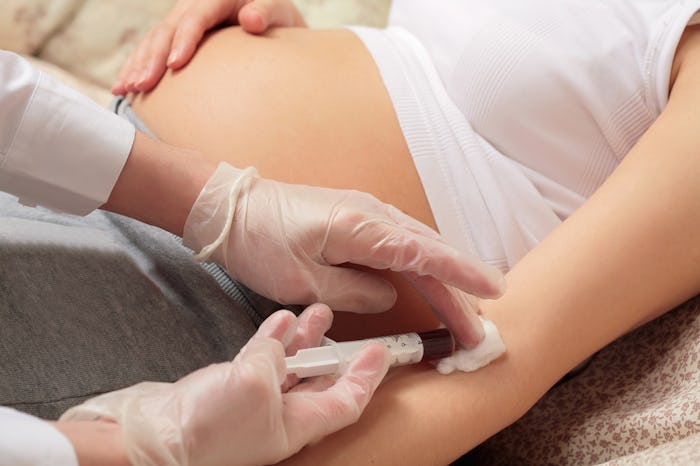Life

Low Platelets During Pregnancy Are A Thing & Here's How They Can Impact Your Delivery
If you've watched ER as many times as I have, you'll probably begin to say the phrase, "Let's move," in regular conversation (thanks Dr. Benton), and you'll also begin dreaming of the phrase, "Let's get a CBC and a chem lab," or some variation of it. Apparently, a CBC means "complete blood count," and it relates to your platelets. If you’ve heard your OB-GYN ask for a CBC and wanted to monitor your platelets because they're low, don’t fret yet. But you may be wondering, "What does it mean if you have low platelets during pregnancy?" Fortunately (unfortunately?) you won't suddenly be rushed to the ER with Noah Wyle giving you CPR.
Dr. Yvonne Bohn, an OB-GYN at Providence Saint John’s Health Center in Santa Monica, California, tells Romper, “The three most common reasons for low platelets in pregnancy are gestational thrombocytopenia, hypertensive disorders such as preeclampsia leading to low platelet count, and a preexisting autoimmune cause called immune thrombocytopenic purpura (ITP).”
Thankfully, low platelet counts only happen in between 7 and 10 percent of pregnancies, Bohn says. Unfortunately, however, there’s no way to prevent it, but low platelets don’t usually affect the baby “except in ITP,” she adds. It does however, affect you, because you could have problems with hemorrhaging and bleeding. And if you wanted an epidural or anesthesia, you may not be able to get them done if your platelet count is below 80,000, Bohn notes.
So what is the most common cause of low platelet counts? Gestational thrombocytopenia, according to Bohn, and it accounts for 70 percent of cases. “It usually occurs in the late second trimester or early third trimester. In this case, the women will have normal platelet counts — more than 150,000 — but in the late second trimester or early third trimester, the platelet count will start to decline below 150,000,” Bohn explains. “In this condition, there is abnormal destruction of the platelets, and in most cases, the platelet counts do not drop to dangerous levels and it does not affect the fetus.”
In order to keep track of where you stand, your doctors will do more frequent check-ins. “In most cases, women will get regular blood checks to monitor the platelets.” Bohn says as long as the counts do not fall below 80,000, it usually doesn't affect your labor. “However, in rare cases where the platelet count does get too low, a woman may get steroids to increase the platelet count. In gestational thrombocytopenia, the platelets also tend to be larger so normally we do not see issues with excessive bleeding,” she says.
The second most common cause is if you develop preeclampsia, according to Bohn. It happens at the end of your pregnancy and your counts drop to a “dangerously low level. This is a severe form of preeclampsia called HELLP syndrome, and this condition is treated by delivery of the baby. Once the baby is delivered, the platelet count will start to return to normal levels. If the platelet count is very low, a woman may require a platelet transfusion.”
And as far as thrombocytopenic purpura goes, Bohn says this exists before you even get pregnant as it’s an autoimmune-driven cause. “The antibodies that destroy the platelets in the mom can also destroy the platelets in the baby because they cross the placenta, and can cause low platelet counts in the baby as well.” Thankfully, this condition can be easily treated with steroids, according to Bohn.
Turns out, low platelet counts don't seem to be super common in pregnancies. But your doctor will be monitoring you at every visit, and if you have some sort of preexisting condition that may cause you to have a risk of a low platelet count, they'll definitely be keeping an eye on you. If you do have it, it's typically not life-threatening to your or your baby, as long as your doctor is aware.
Check out Romper's new video series, Romper's Doula Diaries:
Check out the entire Romper's Doula Diaries series and other videos on Facebook and the Bustle app across Apple TV, Roku, and Amazon Fire TV.